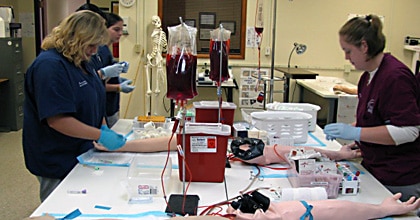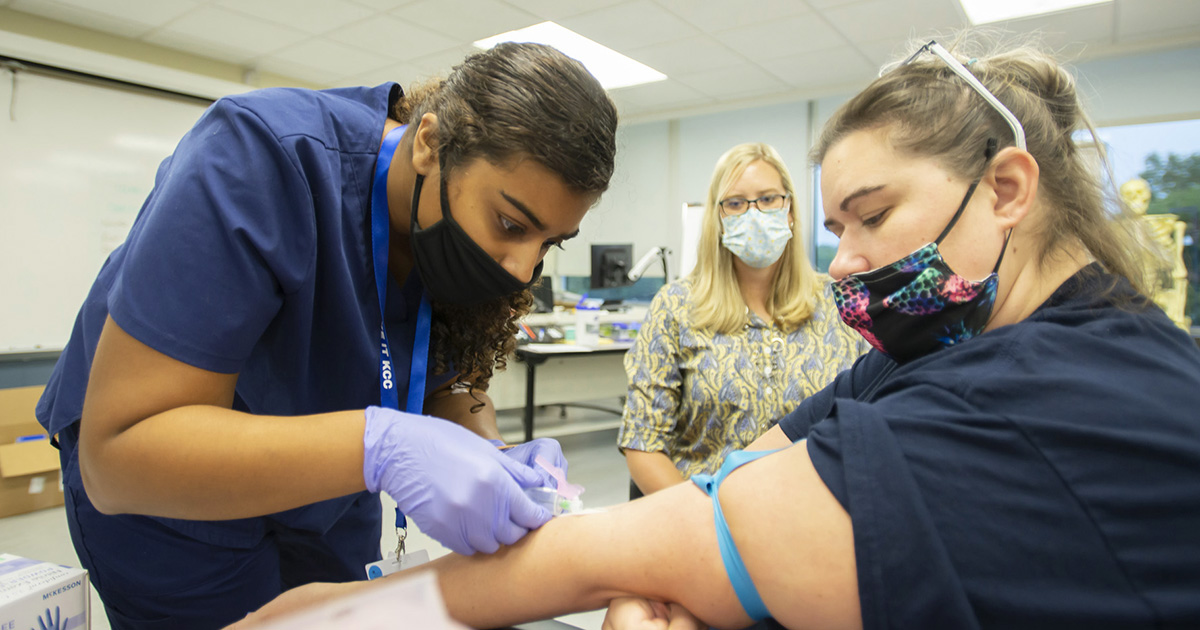10 Must-Have Skills You’ll Learn in a Phlebotomy school
10 Must-Have Skills You’ll Learn in a Phlebotomy school
Blog Article
The Path to Accreditation: Recognizing the Phlebotomy Educating Training Course Trip and Its Importance
As you take into consideration the course to qualification in phlebotomy, it's vital to understand the duty you'll play in medical care. Your training will certainly cover crucial abilities, from blood collection strategies to patient communication.

The Function of Phlebotomists in Healthcare
Phlebotomists play an essential function in the healthcare system, working as the essential web link between patients and necessary diagnostic screening. You'll carry out blood attracts, guaranteeing examples are collected properly and safely. Your experience assists in detecting medical problems, keeping track of wellness, and assisting therapy decisions.
In your everyday communications, you'll need to develop trust with individuals, making them really feel comfortable during what may be a stressful experience. You are in charge of classifying and dealing with examples carefully to avoid contamination or mistakes, which can affect test outcomes.
Yet, you'll frequently function along with doctors and nurses, connecting critical info concerning patients' conditions. Your function is essential in keeping the workflow in health care settings, making certain prompt and accurate results. By grasping your skills, you add meaningfully to client treatment, making you a vital component of the clinical group. Embracing this duty is vital to your success as a phlebotomist.
Summary of Phlebotomy Training Programs
When checking out phlebotomy training programs, you'll discover different types made to fit various timetables and finding out styles. Each program helps you develop necessary abilities like blood collection and individual communication. Comprehending these choices is essential to choosing the best path for your career.
Kinds of Educating Programs
Numerous kinds of training programs are offered for those wanting to become proficient in phlebotomy. You can pick from certification programs, which commonly last a couple of months and concentrate on vital skills. There are also diploma programs that offer an even more detailed education and learning, commonly lasting up to a year. If you're searching for a much deeper understanding, an associate level in an associated area could be the ideal fit. Online training courses provide flexibility for those stabilizing work or household commitments, allowing you to examine at your own speed. Additionally, some hospitals and clinics provide on-the-job training programs, offering useful experience while you find out. Whatever path you select, each program intends to furnish you with the required abilities for a successful phlebotomy occupation.

Secret Skills Established
Understanding phlebotomy calls for a collection of key skills that are developed through extensive training programs. You'll find out technological abilities like correct blood vessel option, needle insertion, and blood collection techniques. These hands-on practices guarantee you can perform procedures safely and efficiently. Additionally, communication abilities are basic; you'll require to interact with patients, explain procedures, and placed them secure. Recognizing makeup and physiology is essential, also, as it assists you find capillaries and understand the body's response to blood attracts. Lastly, you'll acquire knowledge of safety methods and infection control, ensuring you preserve a sterilized environment. Each of these abilities is crucial for your success as a licensed phlebotomist, making you a useful asset in any health care setting.
Secret Components of a Phlebotomy Program
In a phlebotomy training course, you'll concentrate on essential subjects that prepared for your future occupation. You'll take part in hands-on training that permits you to apply what you have actually found out in real-world setups. Both the curriculum and useful experience are vital for your success as a phlebotomist.
Curriculum Review
While pursuing a phlebotomy training course, you'll run into a curriculum made to equip you with basic abilities and knowledge. Phlebotomy Classes Near Me. This curriculum commonly includes anatomy and physiology, concentrating on the circulatory system and understanding blood parts. You'll also discover different kinds of blood collection approaches, consisting of venipuncture and capillary puncture methods
Additionally, infection control and safety and security methods are essential components, guaranteeing you recognize exactly how to preserve a sterilized environment. You'll research patient communication, highlighting communication and compassion, which are essential for alleviating individual stress and anxiety.
Hands-On Training Experience
Getting hands-on experience is an essential part of your phlebotomy training program. This useful training allows you to use what click over here you have actually learned in a real-world setup, improving your skills and self-confidence. You'll practice venipuncture techniques, find out exactly how to handle various kinds of specimens, and obtain aware of the tools made use of in the field. Under the advice of seasoned trainers, you'll improve your abilities, ensuring you're planned for any scenario you may face.
In addition, you'll get the opportunity to communicate with people, which is important for creating your communication abilities. This mix of technical efficiency and social skills is important for your success as a licensed phlebotomist. Inevitably, hands-on training is where theory satisfies technique, solidifying your expertise and readiness for qualification.
Certification and Licensing Demands
Prior to you can begin your profession in phlebotomy, it is essential to understand the accreditation and licensing demands that vary by state. The majority of states require phlebotomists to hold an accreditation from an acknowledged company, such as the National Phlebotomy Organization or the American Society for Medical Pathology. These accreditations commonly involve passing an exam that evaluates your understanding and abilities in the area.
Along with certification, some states have specific licensing demands. You may require to finish a specific variety of hours in professional technique, send proof of training, or undergo a background check. It is very important to investigate your state's guidelines to ensure you fulfill all necessary criteria.
Remaining educated concerning these needs not just aids you safeguard a placement yet also boosts your credibility as a professional. By fulfilling these needs, you'll be well on your way to an effective job in phlebotomy.
Hands-On Training and Practical Experience
Hands-on training and practical experience are vital parts of your phlebotomy education and learning, as they enable you to apply theoretical official website expertise in real-world scenarios. Throughout your training, you'll engage in supervised venipuncture, find out correct methods, and end up being familiar with numerous blood collection devices. This direct participation is important for developing your confidence and sharpening your abilities.
You'll work closely with seasoned experts who can guide you via the nuances of person communication and sample handling. Each practice not just strengthens your understanding yet likewise prepares you for the hectic setting of healthcare settings.
In addition, many programs include clinical turnings, allowing you to experience varied setups, from health centers to outpatient click site centers. This direct exposure assists you adjust to different obstacles and client demands, ensuring you're well-prepared for your future function. Embrace these chances, as they're important to ending up being a proficient and thoughtful phlebotomist.
Challenges Encountered During Training
While getting hands-on experience is important, it is very important to recognize the difficulties that can emerge during your phlebotomy training. You may run into anxiety when doing treatments on real individuals, specifically if you're new to the environment. The pressure to obtain every little thing right can be overwhelming. Furthermore, grasping the abilities needed for blood draws takes practice; you may fight with strategy initially.
Time monitoring can additionally be an obstacle, as harmonizing concept, useful sessions, and personal dedications can feel challenging. You might deal with varying discovering speeds among your peers, causing sensations of insecurity if you assume you're dropping behind. Adjusting to the various personalities of instructors can be tough, as each might have an one-of-a-kind training design.
Acknowledging these challenges early can prepare you for success and assist you establish resilience throughout your training journey.
Career Opportunities After Certification

As you get experience, you might also consider concentrating on areas like pediatric or senior citizen phlebotomy, catering to details individual demands. Some phlebotomists select to advance their careers by coming to be lab specialists or pursuing more education in health care areas.
Additionally, your accreditation can bring about roles in training or overseeing brand-new phlebotomists, allowing you to share your understanding. With the medical care sector constantly growing, your abilities will certainly always be in demand, leading the way for a stable and satisfying occupation. Welcome the opportunities waiting on you!
Often Asked Inquiries
What Is the Typical Duration of a Phlebotomy Training Course?
Phlebotomy training courses commonly last around 4 to eight weeks. You'll take part in hands-on method, class guideline, and on-line learning. Completing this training prepares you for certification and a gratifying job in health care.
Are Online Phlebotomy Courses Available?
Yes, on-line phlebotomy programs are readily available. They supply adaptability and benefit, permitting you to examine at your very own speed. Just verify the program is certified to meet certification requirements and gain valuable abilities for your job.
Just How Much Does Phlebotomy Training Typically Price?
Phlebotomy training commonly sets you back in between $700 and $2,500, depending upon the program and location. You should take into consideration variables like training course length, included products, and hands-on experience when picking the ideal training for you.
What Are Common Requirements for Phlebotomy Training?
Typical requirements for phlebotomy training commonly include a senior high school diploma or GED, immunizations, and a history check. Some programs may additionally need basic health care knowledge or accreditations, ensuring you're gotten ready for hands-on training.
Can I Work While Completing My Phlebotomy Training?
Yes, you can function while completing your phlebotomy training. Several trainees equilibrium jobs with their researches, but make specific to handle your time efficiently to assure you satisfy both job and training commitments effectively.
Report this page